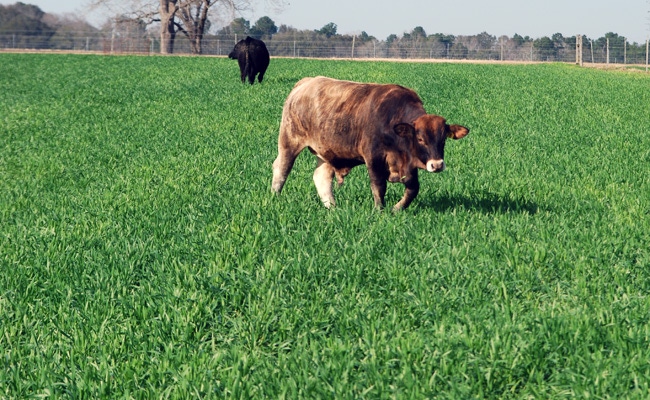September 19, 2015

I have frequently been asked a very good question: “What would happen to my bermudagrass if I were to chemically-frost it in mid-September so that I can get a jumpstart on planting my winter annuals?”
The goal of most winter forage systems is to start grazing as soon as possible and continue grazing as late as possible. Early grazing generally requires early planting, but this is not so easy when one is dealing with a warm season grass sod. During the past few years, a number of producers have wrestled with this challenge.
One idea is to use what some call the “frost-in-a-bottle” technique. In this scenario, a producer would apply a light rate of herbicide to cause the bermudagrass to stop growing, in essence acting like an early hard frost.
Several years ago, researchers in Alabama’s Coastal Plain examined the idea of using glyphosate (e.g., Roundup, Gly-4, Glyfos, etc.) or paraquat (e.g., Gramoxone Inteon, Firestorm, etc.) on bermudagrass ahead of mid-September plantings of winter annual forages. They studied the effect of glyphosate, paraquat, and no chemical application when rye-ryegrass-arrowleaf clover.
The results of this study essentially found that if one looks at the season-long total forage yield, there really was no benefit of using a chemical suppressant when attempting to establish winter annuals into bermudagrass sod. More recent research in Texas using newer herbicide chemistries generally demonstrated a similar lack of benefit.
So, it would be easy to leave it at that: chemically frosting the sod is of no benefit. Though that seems true in an academic sense, it may also be naïve. A more prudent statement is that using an herbicide to cut short the bermudagrass growing season is likely to be of no benefit in most years and situations, but there may be some years and/or situations when it would be beneficial.
My colleagues and I have had some recent on-farm experiences in irrigated pastures where we have observed that chemically frosting the sod allowed 2 to 3 weeks of earlier grazing. In those situations, the cost of the herbicide application (usually < $10/acre) is more than offset by the value of the earlier grazing.
Admittedly, irrigated pastures are a relatively narrow niche. However, there are other situations where I suspect desiccating bermudagrass with an herbicide could be beneficial. These include when the conditions in September and October are projected to (and turns out to) provide 1) above normal rainfall, 2) moderate temperatures (i.e., above 65° but not consistently above 85°), and 3) low humidity.
Fortunately, there does not appear to be any long-term negative side effects of occasionally using low rates of an herbicide to chemically frost the sod (assuming the stand is healthy to begin with). So, if weather projections appear to provide these conditions, it may be worth taking the chance if a jumpstart on winter grazing would be valuable.
You May Also Like




